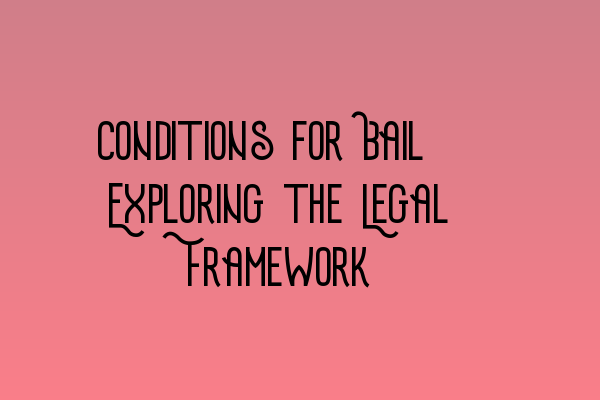Conditions for Bail: Exploring the Legal Framework
When someone is accused of a criminal offense, one of the most crucial aspects of the legal process is determining whether they should be granted bail. Bail allows the accused to be released from custody pending their trial, under certain conditions. In the United Kingdom, the legal framework surrounding bail is comprehensive and designed to protect the interests of both the accused and society as a whole. In this article, we will delve into the conditions for bail and explore the legal principles that govern them.
The Purpose of Bail
Before we delve into the specific conditions for bail, it is important to understand the purpose behind granting bail to an accused individual. The primary objective of bail is to ensure the defendant’s appearance in court for trial while also safeguarding public safety.
When considering whether to grant bail, the court must balance the accused person’s right to their liberty against the need to protect the public and maintain confidence in the criminal justice system. This delicate balance is achieved by imposing conditions on bail that help manage the potential risks associated with the release of the accused.
Common Conditions for Bail
1. Residential Address: One of the most fundamental conditions for bail is providing a valid residential address where the accused will reside during the bail period. This ensures that the court can easily locate the accused and facilitates effective communication between the accused and their legal representatives.
2. Curfew: A curfew condition may be imposed, requiring the accused to remain at a specified location during specific hours of the day or night. This helps monitor the accused’s movements and minimizes the risk of them committing further offenses or interfering with witnesses.
3. Reporting Obligations: The court may require the accused to report to a designated police station or a specific person regularly. This condition allows the authorities to keep track of the accused’s activities and ensures their compliance with bail conditions.
4. Non-Contact Orders: In cases involving allegations of harassment or domestic violence, the court may impose a non-contact order, prohibiting the accused from contacting the victim or other specified individuals. This condition is crucial for ensuring the safety and well-being of those involved.
5. Surrender of Passport: In situations where there is a risk that the accused may attempt to flee the country, the court may order the surrender of their passport. This condition effectively prevents the accused from leaving the jurisdiction without permission.
6. Financial Sureties: Bail may be granted on the condition that the accused provides a financial surety, usually in the form of a monetary deposit or property. This guarantees the accused’s compliance with bail conditions and provides the court with an incentive to appear for trial.
It is crucial to note that the specific conditions for bail can vary depending on the severity of the alleged offense, the accused person’s criminal history, and the individual circumstances of the case. The court has the discretion to impose additional conditions or amend existing ones as deemed necessary.
Conclusion
Conditions for bail play a pivotal role in ensuring the fair and effective administration of justice in the criminal legal system. By carefully imposing conditions that balance the interests of the accused and society, the court can reasonably manage the risks associated with the release of the accused. Understanding the legal framework surrounding bail conditions is imperative for anyone involved in the criminal justice system, be it defendants, solicitors, or legal professionals.
At SQE Criminal Law & Practice Law UK, our team of expert solicitors is well-versed in the intricacies of the bail process. Visit our website to learn more about the SQE 1 Practice Exam Questions or check out our SQE 1 Practice Mocks FLK1 FLK2 to enhance your preparation for the SQE exams. If you are looking for comprehensive preparation courses, don’t miss our SQE 2 Preparation Courses or our SQE 1 Preparation Courses. Stay updated with the latest SRA SQE Exam Dates by visiting our website regularly.
